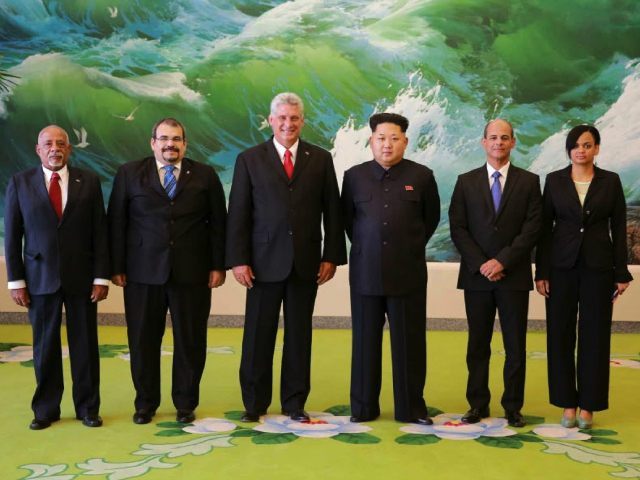The communist governments of North Korea and Cuba have agreed to a new “international collaboration” in which the governments will barter goods and intelligence to avoid having to use any currency in exchanges. The news surfaces as reports suggests North Korea is preparing a rocket launch, while Cuba currently possesses a U.S. hellfire missile through human error.
The website Capitol Hill Cubans flags down the official announcement on Cuba’s state-run Prensa Latina, which claims that officials from both governments met in Havana to sign “two protocols of international collaboration in trade and scientific-technical development.” The trade protocol establishes the transaction of goods through the Barter mode of exchange,” the article claims, adding that Cuba expects North Korea to aid in the development of goods necessary to refurbish the nation’s languishing rail system and to “promote the island’s sugar industry.” Prensa Latina does not discuss what North Korea will gain in exchange for these benefits to Cuba.
The parallel announcement in North Korea’s Korean Central News Agency (KCNA) also makes no mention of what North Korea is seeking from Cuba. KCNA describes the deal as involving “economic, scientific and technological cooperation and development in 2016 and commodity exchange in 2016.” It yields little other information.
The Latin Post notes that the barter agreement makes it easier for both governments to exchange goods and information without having to pay each other in either their own decimated currencies or a neutral international currency. 899.99 North Korean won are necessary to purchase a U.S. dollar; 26.5 Cuban pesos make up one U.S. dollar.
North Korea and Cuba have long enjoyed friendly relations and supported each others’ repressive communist regimes in the international arena. They have also been involved in clearly illegal weapons activity, though there is no public information regarding the scale of this trade. “In the past 2½ years Cuba has tried to smuggle weapons to Pyongyang, engaged in high-level meetings with North Korean officials, and secured US military technology,” the Wall Street Journal‘s Mary Anastasia O’Grady reported earlier this month.
O’Grady was among the first to warn that information regarding a missing U.S. Hellfire missile appearing in Cuba could potentially lead to further weapons development for North Korea. The missile allegedly surfaced in Cuba earlier this month, having been sent to Havana instead of Florida by Spain. Cuba still enjoys possession of the missile which, despite having an inert warhead, may be used to reverse-engineer some American weapons technology. What the Cuban government has done with the missile is still unknown.
Following President Obama’s decision to yield numerous concessions to the regime of dictator Raúl Castro in December 2014, the North Korean government has expanded efforts to get closer to Havana. Pyongyang sent its top diplomat, Kang Sok Ju, to Cuba in June 2015. His visit followed that of North Korean Foreign Minister Ri Su-yong, who, in March 2015, applauded Cuba in Havana for “fighting together in the same trench against American imperialism, which continues to exert economic pressure on our countries to this day.” In addition to his meeting with Cuban Foreign Minister Bruno Rodríguez, Ri also enjoyed a “fraternal meeting” with Raúl Castro himself.
In addition to overt relations, the discovery of a major arms shipment from Havana to Pyongyang in 2013 alerted the international community to how ties between North Korea and Cuba were as much military as civilian in nature. That year, Panamanian maritime officials discovered parts for a surface-to-air missile defense system in a ship allegedly transporting Cuban sugar to Asia. The weapons parts were allegedly obsolete and intended to be refurbished in North Korea. The materials were hidden under 240,000 sacks of brown sugar, reported indicated. Upon its seizure, the captain of the ship died of a heart attack.
The Cuban government eventually claimed the shipment was legal and accounted for, though never explained why someone made the decision to hide the part if so. Pyongyang paid a $700,000 fine for violating sanctions.
In addition to supporting North Korea, Cuban authorities have given safe haven to the leadership of the Revolutionary Armed Forces of Colombia (FARC), a Marxist terrorist organization, and has ties to the Shiite Islamist terror group Hezbollah. The Obama administration nonetheless removed Cuba from its list of state sponsors of terrorism in April 2015. Castro has since repeatedly demanded that the United States lift economic sanctions on Havana for years of human rights abuses, though he declared following President Obama’s speech announcing concessions, “now we have really won the war.”
President Obama is hoping to visit Cuba in 2016, the White House confirmed this month, with White House deputy national security adviser Ben Rhodes expressing optimism that Cuba will change its human rights outlet in ways “consistent with their revolution.”
North Korea, meanwhile, may be attempting to follow up its claim that it detonated a hydrogen bomb with another rocket launch. “The indications are that they are preparing for some kind of launch… Could be for a satellite or a space vehicle — there are a lot of guesses,” a source told AFP last week.

COMMENTS
Please let us know if you're having issues with commenting.